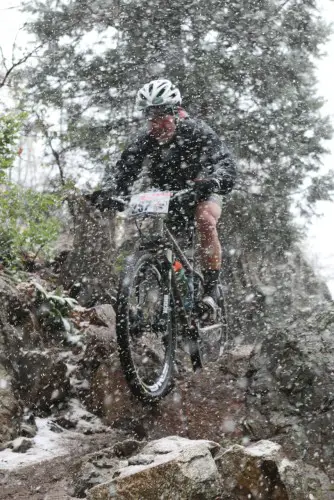Some Monday politics from US MTB advocacy organisations!
John Bliss, former chair of the International Mountain Biking Association (IMBA), has left to join the Sustainable Trails Coalition (STC). As well as the STC’s press release to announce the move, he’s also issued a scathing open letter accusing IMBA of being overly bureaucratic.
Bureaucracy can create stability, but that might not be a desirable quality in places where the status quo leans heavily against mountain biking. UK MTB trail advocacy largely seems to be exactly the kind of local evaluation and action he talks about, and while that can only ever have limited effects when it comes to national policy, we’ll always advocate that every rider find and join their local trails group. It’s not guaranteed that trail access will always progress toward “more, and better” rather than “less, and worse”, especially with cuts threatening trail centres and outdoor maintenance budgets in the UK. As well as that, it’s always going to be riders on the ground who can inform advocates operating further up the political chain.
John’s full letter is copied below. While it’s largely confined to issues in the US, with so many local organisations and so much debate springing up in the UK over trail access in the past few years, it’s an interesting perspective to read.
“OPEN LETTER TO MTB COMMUNITY FROM FORMER IMBA CHAIR
January 16, 2016
Dear fellow mountain bikers:
I’m honored to accept the invitation of the Sustainable Trails Coalition (STC) to serve on its Board. There’s been much discussion of late about the relative pros and cons of STC and IMBA, so I thought it appropriate to offer a civil, yet transparent explanation for why a former IMBA Chair such as myself would choose to dedicate his efforts exclusively to STC’s mission.
1. STC’s mission is clear, straightforward and reasonable: to remove needless access restrictions and address the poor state of our trail system. STC proposes to address these concerns with modest, reasonable legislation: the Human-Powered Wildlands Travel Management Act of 2016 (HP-WTMA).
2. HP-WTMA would, among other things, reform the blanket nationwide bicycle bans in Wilderness by allowing each National Forest or other public land unit to decide on bicycle access at the local level. I stress: local input from mountain bikers and local decision making! Importantly, neither STC or HP-WTMA advocated for a blanket right to ride in Wilderness.
3. IMBA has historically and consistently demonstrated disinterest in seeking changes to current Wilderness law. During my chairmanship of IMBA and certainly well before it, the organization consistently displayed a lack of enthusiasm for joining this fight. Given the clear choice between seeking this modest right for mountain bikers and potentially jeopardizing relationships with agencies and land managers (which IMBA regards as critical to its mission,) IMBA has opted to side with the status quo, preferring relationship preservation over the potential to reinstate mountain biker access where appropriate. Regrettably, this “play nice” approach with regulators hasn’t worked so well recently, particularly in Idaho where recent loss of mountain biking access in the new Boulder–White Clouds Wilderness near Ketchum and Stanley lead Idahoans to donate $5,000 to STC through the Southwest Idaho Mountain Biking Association (SWIMBA).
4. STC’s legislative efforts are timely and professionally guided by smart, tested government relations experts. Never has there been a better time politically to seek these proposed legislative changes.
5. IMBA is structured as a 501 (c)(3) so it can’t lobby without jeopardizing this particular tax status. STC is a 501(c)(4) which is designed to permit lobbying.
6. As bureaucracies age they ossify. At 28 years old, IMBA is increasingly bureaucratic; STC isn’t. Bureaucracies are characterized by inertness, slowness to action, and preoccupation with administering overgrown organizations. By contrast, STC is nimble, lean-and-mean, singleminded and laser focused. This “startup” approach will serve mountain bikers well.
7. IMBA has been invited but has declined to support STC. On Dec. 29, STC’s Founder Ted Stroll sent a letter to IMBA’s Executive Director Mike Van Abel asking whether IMBA would publicly support STC and its efforts. This lack of formal response to a sister advocacy organization is disappointing given IMBA’s admission that it can’t lobby and is a disservice to all mountain bikers, including the growing numbers who support STC.
8. In politics, when you disagree on tactics but support the objective, the takeaway too often is akin to “You’re not with me, you’re against me.” IMBA has repeatedly said that it shares STC’s larger vision about mountain bikes but differs on tactics. Let’s be very clear what that means. This is simply polite bureaucratese for: “we don’t support you; please go away.” In my humble opinion, that stance is unnecessarily short-sighted.
In summary, given IMBA’s history of studied intransigence on Wilderness, its unwillingness to support STC publicly, and the justness and ripeness of this cause, I felt it was time to place my support behind this “little engine that could”. That engine is STC. They’re making a difference for mountain bikers in the halls of Congress. And they aren’t going away.
With STC’s help, I look forward to a day where my right to seek solitude on a bike doesn’t take a back seat to similar solitude-seeking rights of hikers or equestrians, whose trail impacts are widely regarded as more impactful than our two human powered rubber wheels.
I hope you’ll join me in supporting STC’s reasonable and limited efforts.
Thanks for your consideration.
John Bliss
Current Board Member, STC
Former IMBA Chair 2010
IMBA Board Member 2006-2010
Former IMBA member”

Comments (1)
Leave Reply
Post Comment


no 3 Especially in the UK – the Old IMBA felt like apologists, with ex game keepers on board and the focus on trial building, not land access IMO.